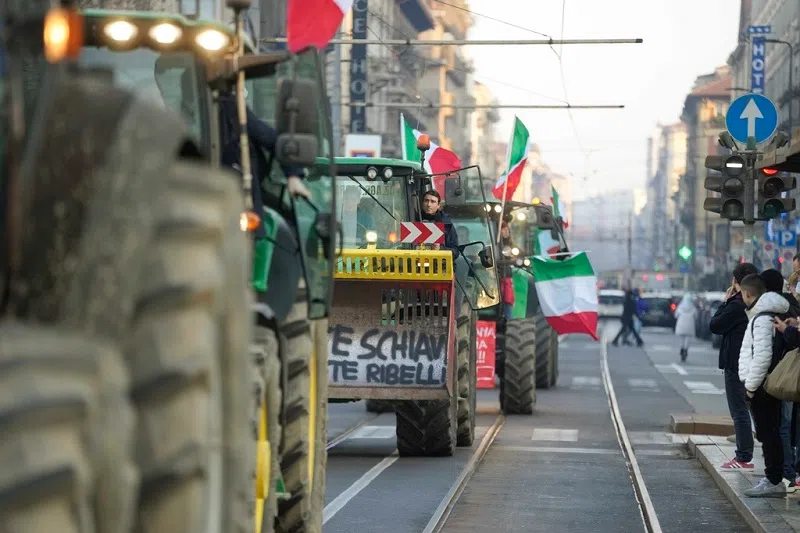JUNE 4, 2024:
BEERSEL, Belgium (AP) — Tractors are rumbling through the streets again days ahead of the four-day European Union election. The populist and hard right groups have instrumentalized agriculture throughout the 27-nation bloc in the months leading up to the polls. They claim farmers have become the victims of an overbearing EU and environmentalists that fail to take their considerations into account. The issue is expected to have a real impact on the outcome of the election where populist and hard right parties are expected to surge.
FEBRUARY 1, 2024:
BRUSSELS (AP) — Farmers burned bales of hay, threw eggs and firecrackers at police — and wrested some promises of relief from European leaders on Thursday (Feb. 1, 2024), the culmination of weeks of protests across the continent over excessive red tape and competition from cheap imports.
Eager to reassure a key part of the electorate and end disruptions in several cities, leaders at a European Union summit in Brussels showered the farmers with compliments and compassion — if few concrete proposals. In France, the government did make significant concessions — enough that two major famers’ union promised to suspend the chokehold their tractors have placed on Paris for days.
For weeks, farmers have complained that it’s becoming harder than ever to make a decent living as energy and fertilizer costs surge because of Russia’s war in Ukraine, more and cheaper farm imports enter the bloc, and climate change-fueled droughts, floods or fires destroy crops.
Their protests have snarled traffic in cities, preventing millions of European citizens from getting to work or school, while blockades of ports and major traffic arteries meant flowers wilted in trucks and supermarket shelves were left bare. Hungarian Prime Minister Viktor Orbán even complained the endless honking of tractors kept him up at night.
On Thursday, as thick smoke from burning bales of hay and tires hung over parts of the Belgian capital, security forces used water cannons to douse fires and keep a farmer from felling a tree on the steps of the European Parliament. They could not prevent one bronze statue being pulled off its pedestal and scorched. In Greece, farmers rallied outside an agricultural fair, while others drove their tractors into Milan.
But ahead of EU parliamentary elections in June, most leaders at the summit were clearly keen to win over farmers, especially as populist and hard-right politicians have latched on to the their plight in recent weeks.
“Don’t demonize the farmers. Don’t send the army on them. But talk to them,” Belgian Prime Minister Alexander De Croo said.
Leaders welcomed the plan of the European Commission, the EU’s executive branch, to shield farmers from cheap imports from Ukraine during wartime and allow farmers to use some land that had been forced to lie fallow for environmental reasons.
EU Commission chief Ursula von der Leyen also promised Thursday to prepare by the end of the month new plans to cut reams of bureaucratic rules to make sure farmers can spend more time in their fields, not in their offices. The suggested speed seemed light years faster than some other EU initiatives take.
And in France, Prime Minister Gabriel Attal announced a new set of measures, including hundreds of millions of euros in aid and tax breaks, and also promised not to ban pesticides in France that are allowed elsewhere in Europe.
In Brussels, many leaders also said they would not approve a trade deal with South American nations that is under consideration unless any imports would meet the same regulatory standards that EU farmers face, a key demand from the sector.
“The priority for us should be implementing existing rules and regulations and not imposing new additional ones on farmers over the next couple of years,” said Irish Prime Minister Leo Varadkar, adding to a chorus of soothing words from leaders on the subject.








Comments